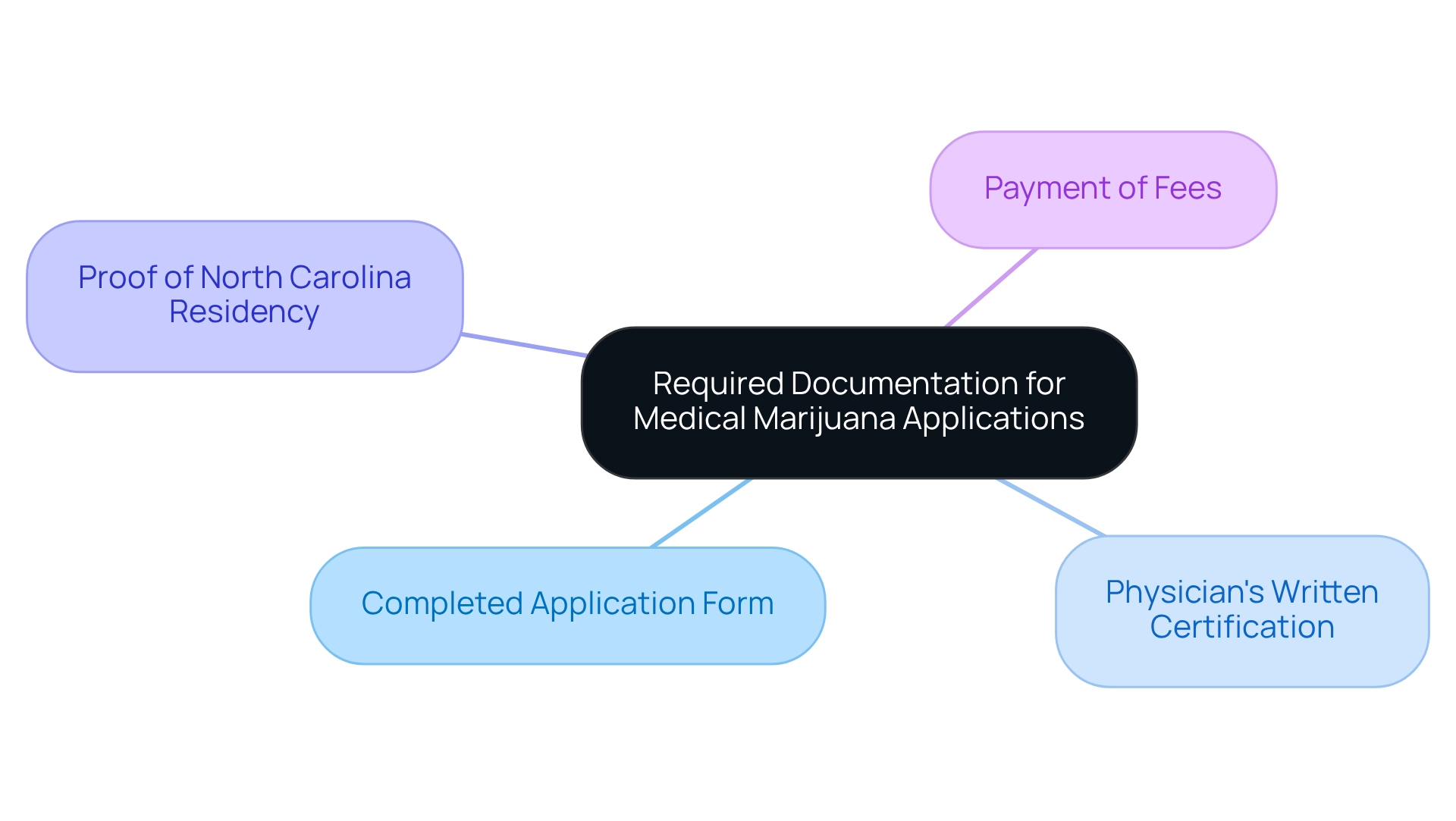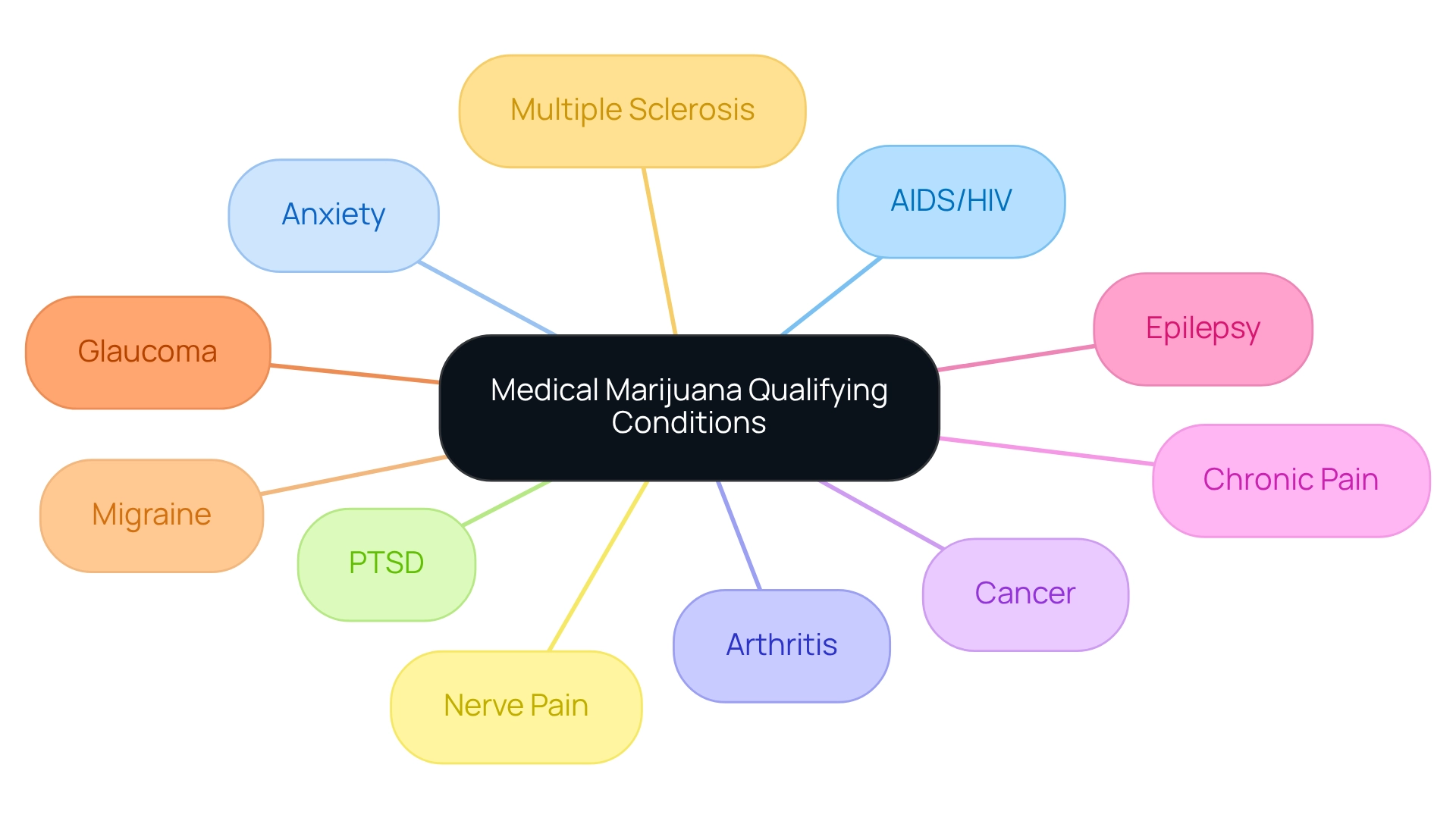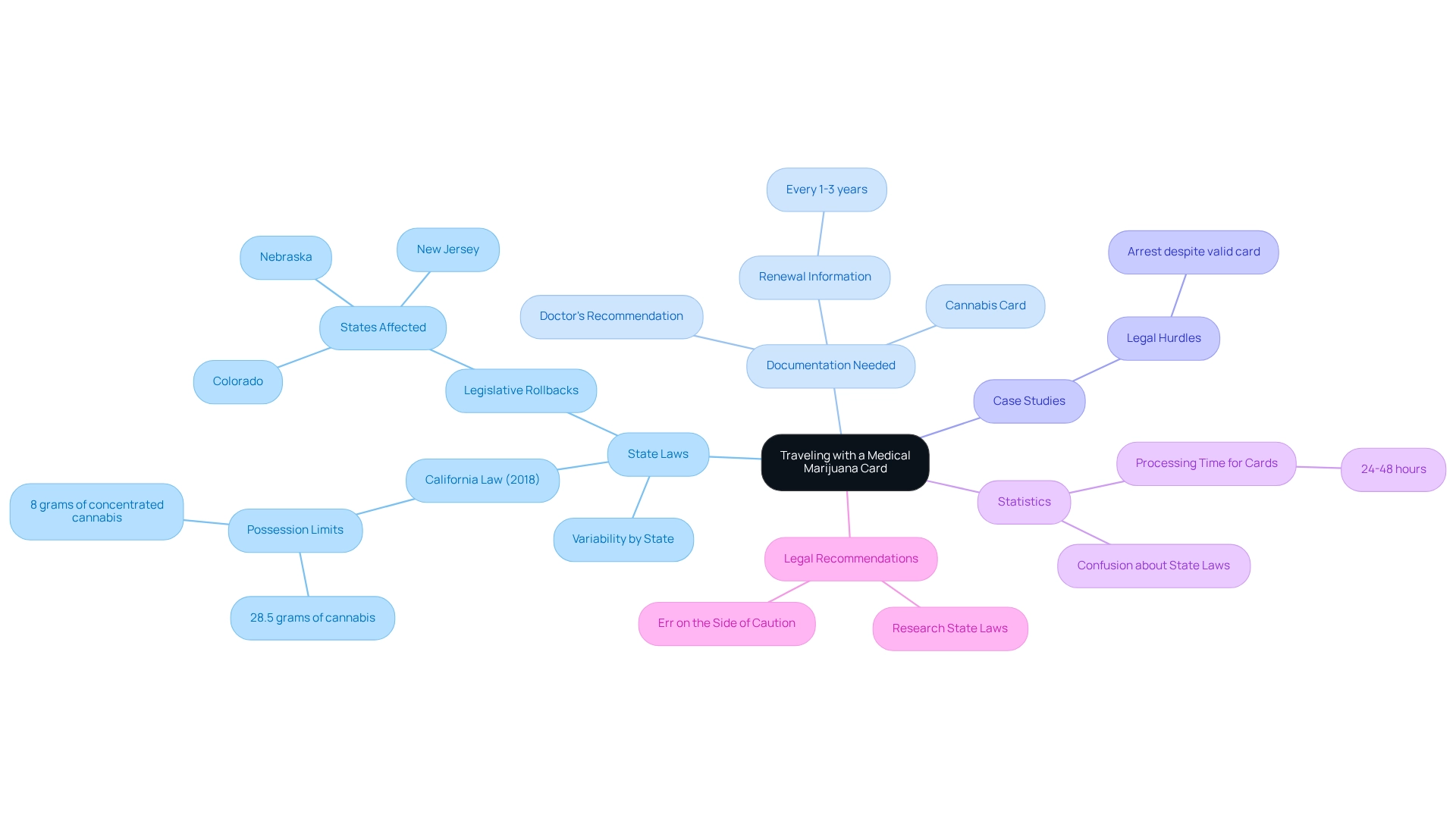What Are the Medical Marijuanas NC Qualifying Conditions? A Comprehensive Overview
by Maya Green · April 11, 2025
Explore the medical marijuanas NC qualifying conditions and their therapeutic benefits for patients.

Overview
In North Carolina, the qualifying conditions for medical marijuana encompass:
- Chronic pain
- Anxiety
- Epilepsy
- AIDS/HIV
- Arthritis
- Cancer
- Glaucoma
- Migraine
- Multiple sclerosis
- Nerve pain
- PTSD
These conditions were chosen with great care, recognizing the debilitating impact they can have on individuals’ lives. It’s important to remember that cannabis may offer significant therapeutic benefits, providing relief where traditional treatments may fall short.
The ongoing legislative efforts are aimed at establishing a regulated program for therapeutic use in the state, reflecting a compassionate approach to addressing the needs of those who suffer. As we navigate this journey together, it’s encouraging to see the focus on creating a supportive environment for patients seeking relief. You may find that understanding these developments can empower you or your loved ones in making informed decisions about treatment options.
Introduction
In North Carolina, the conversation surrounding medical marijuana is gaining momentum as the state navigates a complex legal landscape. It’s important to recognize that many individuals are seeking relief from debilitating conditions, and while the full legalization of medical cannabis remains on the horizon, initiatives like the North Carolina Compassionate Care Act are paving the way for these patients to access alternative treatments. As more residents advocate for change, significant discussions and proposals are emerging, aimed at establishing a regulated medical cannabis program.
You may find that understanding the intricacies of the application process, the required documentation, and the evolving legal protections is becoming increasingly vital. As patients seek relief from chronic pain, anxiety, and other qualifying conditions, this journey can feel overwhelming. This article delves into the current status of medical marijuana in North Carolina, exploring the potential benefits, legal implications, and the role of telehealth services in facilitating access for those in need. Together, we can navigate this path towards better health and well-being.
Understanding Medical Marijuana Legality in North Carolina
In North Carolina, the legal landscape surrounding cannabis is both intricate and evolving, which can feel overwhelming for those seeking relief. As of 2025, the state has not yet fully legalized therapeutic marijuana, but significant discussions and legislative initiatives are underway to establish a regulated program for therapeutic use. The North Carolina Compassionate Care Act has been introduced, aiming to permit patients suffering from qualifying conditions—such as:
- chronic pain
- anxiety
- epilepsy
- AIDS/HIV
- arthritis
- cancer
- glaucoma
- migraine
- multiple sclerosis
- nerve pain
- PTSD
to access cannabis for therapeutic use legally.
It’s important to remember that, despite these efforts, cannabis consumption remains unlawful for both recreational and therapeutic purposes, except for low-THC hemp products. However, recent developments indicate a growing momentum for reform. A task force has recommended further decriminalization of marijuana possession, currently classified as a class 1 misdemeanor, carrying a fine of up to $200. This suggestion is significant as it reflects a wider trend toward more lenient marijuana laws, aligning with the Pew Research Center’s finding that 74% of Americans live in states where marijuana is legal for either recreational or therapeutic use.
You may find that some small marijuana cultivators, known as ‘caregivers,’ may soon be permitted to grow a limited number of plants per individual, subject to local and state regulations. This potential change could enhance access to therapeutic marijuana, especially for those who may struggle to visit dispensaries.
The successful legalization of therapeutic marijuana in Nebraska, where 70% of voters backed the initiative in the 2024 election, highlights the changing perspectives toward marijuana nationwide and may influence future legislative efforts in North Carolina. Legal specialists indicate that the enactment of the Compassionate Care Act could greatly improve access to therapeutic substances for individuals suffering from qualifying conditions, such as chronic pain and anxiety.
Understanding this legal structure is essential for anyone contemplating therapeutic options as a treatment choice, as it directly influences their ability to secure a medicinal card and access dispensaries. Leafy DOC is here to support you in navigating this process, providing streamlined telehealth services for acquiring marijuana cards. Patients can easily connect with licensed doctors who will assess their qualifying conditions and offer suggestions for therapeutic marijuana through email.
To get started, simply submit an intake form with your personal details and schedule an appointment at your convenience. As the situation evolves, it is crucial for patients to remain informed about legislative changes that might impact their rights and access to therapeutic marijuana.
Qualifying Medical Conditions for a Marijuana Card in NC
As of 2025, North Carolina recognizes several qualifying conditions for obtaining a medicinal cannabis card, including:
- Cancer
- Epilepsy
- HIV/AIDS
- Crohn’s disease
- Multiple sclerosis
- Severe or persistent nausea
These conditions were chosen due to their debilitating nature and the significant therapeutic benefits that cannabis can offer. It’s important to remember that individuals suffering from persistent discomfort associated with cancer often report substantial relief through therapeutic cannabis. Similarly, those with epilepsy may notice a remarkable reduction in seizure occurrences.
Research studies have consistently highlighted the effectiveness of cannabis in managing chronic pain, with many individuals experiencing an enhanced quality of life. A recent survey revealed that 74% of Americans reside in states where marijuana is permitted for either recreational or therapeutic purposes, reflecting a growing acceptance of its healing potential. Moreover, 57% of cannabis users advocate for equal access to industry opportunities, underscoring the importance of fair access to cannabis for all.
In North Carolina, the eligibility requirements for a therapeutic cannabis card involve patients meeting with licensed healthcare professionals who can assess whether their condition aligns with current legal standards. This is particularly significant as the state continues to develop its cannabis policies. Notably, the North Carolina Senate approved a therapeutic herb bill on March 1, 2023, which is currently pending a vote in the House of Representatives. This suggests potential changes in the availability of health-related access.
Healthcare experts emphasize the importance of personalized evaluations, noting that the benefits of therapeutic cannabis can vary greatly among individuals. For instance, those suffering from chronic pain often find that marijuana not only alleviates their symptoms but also reduces reliance on more harmful medications. This patient-centered approach is crucial in ensuring that individuals receive the most appropriate care tailored to their unique needs.
The prevalence of chronic pain among North Carolinians is significant, with many seeking alternative treatments as traditional methods may not suffice. As the state advances its marijuana legislation, the likelihood of increased access to qualifying conditions is growing, paving the way for improved health outcomes and enhanced quality of life. Furthermore, looking globally, Slovenia recently authorized home cultivation of marijuana, indicating a broader acceptance of its use and therapeutic advantages, which could serve as a model for future legislative progress in North Carolina.
Individual stories highlight the transformative impact of medical marijuana. Veterans with PTSD, cancer patients undergoing chemotherapy, and individuals with chronic pain have shared significant improvements in their quality of life. Many prefer cannabis over opioids due to its effectiveness and lower risk of addiction.
Testimonials from Leafy DOC users reflect the compassionate and efficient telehealth services that facilitate access to cannabis, making the process seamless and supportive during challenging times. For example, one individual expressed, “The doctor understood my needs and helped me make an informed decision. Forever grateful!”
These experiences underscore the vital role of cannabis in enhancing well-being and providing relief for those in need.
Navigating the Application Process for Medical Marijuana
Acquiring a cannabis prescription in North Carolina in 2025 involves several important steps designed to ensure that you receive the care you need. To start, you can skip the wait at the doctor’s office by scheduling a consultation with a licensed physician through Leafy Doc’s telehealth services. This can be done from the comfort of your home by submitting an intake form with your personal details and ID.
During your consultation, the doctor will conduct a thorough assessment of your health history and current conditions to determine your eligibility for medical marijuana qualifying conditions. If the physician finds that you meet the criteria, they will provide you with a written certification, which is essential for the application process.
Next, you will need to submit this certification along with proof of residency and any applicable fees to the North Carolina state agency responsible for cannabis applications. To make the application process smoother, it is highly recommended that you prepare all necessary documentation ahead of time. This preparation can significantly reduce the time it takes to obtain your marijuana card, which is typically processed within a few weeks in North Carolina. Statistics indicate that individuals who are well-prepared tend to experience faster approvals.
Indeed, many who utilize services like Leafy DOC, known for its user-focused approach and quick approvals, find the process to be more effective and supportive. It’s important to enter your consultations with a clear understanding of your health conditions and any relevant symptoms you wish to discuss regarding cannabis. Additionally, gathering any prior health records that support your case can be beneficial. Healthcare professionals emphasize the importance of being organized and proactive during consultations to enhance your chances of a successful application.
Understanding the renewal process for your cannabis certifications is also crucial. Typically, renewals occur every one to three years based on state regulations. Keeping track of renewal dates and preparing the necessary paperwork in advance can help ensure you maintain access to cannabis.
Patient experiences in North Carolina have shown that being proactive and organized can lead to a more efficient application process for medical marijuana qualifying conditions, ultimately improving access to the therapeutic benefits of cannabis. As the cannabis market continues to grow, with projections indicating sales reaching $87.0 billion by 2035, understanding the application process becomes increasingly important for those seeking relief through therapeutic cannabis. With Leafy DOC, you can connect with licensed doctors online in minutes, making the journey to obtaining your cannabis card both fast and easy.
Required Documentation for Medical Marijuana Applications
Requesting a cannabis prescription card in North Carolina through Leafy DOC can feel overwhelming, but we’re here to help you navigate the process. To meet the medical marijuana NC qualifying conditions, you’ll need to provide several important documents. These include a completed application form, a doctor’s written verification confirming the qualifying conditions, proof of residency in North Carolina—like a driver’s license or utility bill—and payment of any applicable fees.
It’s important to remember that ensuring all your documents are current and accurately reflect your health status is crucial for a smooth approval process. Incomplete or outdated submissions can lead to delays or denials. Legal experts often highlight that common pitfalls arise from insufficient documentation. Did you know that California was the first state to legalize cannabis under physician supervision in 1996? This groundbreaking decision set the stage for the therapeutic cannabis landscape we see today.
To assist you in this journey, here’s a checklist of the required documentation for therapeutic cannabis applications in North Carolina for 2025:
- Completed application form
- Physician’s written certification
- Proof of North Carolina residency
- Payment of fees
Additionally, keeping copies of all submitted documents for your personal records is highly recommended. Statistics show that many application errors stem from missing or incorrect information, highlighting the importance of thoroughness in the application process. Leafy DOC is committed to providing quick approvals and extensive support through its telehealth services, making it a trustworthy choice for acquiring your cannabis card.
By following these guidelines and ensuring all necessary documents are included, you can enhance your chances of a successful application for therapeutic cannabis. This platform plays a vital role in facilitating access to cannabis, ultimately improving the quality of life for many individuals by simplifying the application process. Furthermore, a Pew Research Center statistic reveals that 54% of Americans live in a state where recreational use of cannabis is legal, reflecting the growing acceptance of its use across the country. You are not alone in this journey, and we are here to support you every step of the way.
Understanding Approval Chances for Medical Marijuana Cards
Acquiring a cannabis card in North Carolina can feel overwhelming, but understanding the essential factors involved can make the process smoother. The completeness of your application and your doctor’s assessment of your health condition in relation to medical marijuanas nc qualifying conditions play crucial roles. It’s important to provide clear and thorough documentation, as well as to work with a physician who is knowledgeable about therapeutic substances. Choosing healthcare providers who truly understand therapeutic marijuana can significantly enhance your chances of approval.
At Leafy DOC, we prioritize a patient-centered approach, offering expert guidance throughout the application process. This support is vital for anyone navigating these complexities.
Staying informed about legal requirements and ensuring meticulous accuracy in your documentation can greatly influence the outcome of your application. As North Carolina refines its therapeutic herb regulations in 2025, grasping these nuances becomes increasingly vital. Recent discussions among legislators, including Senator Cindy Holscher’s remark that “we keep circling here by doing interim committees and never really moving forward on the issue,” highlight ongoing efforts to simplify the approval process, reflecting a broader trend towards more accessible cannabis options.
Leafy DOC has transformed the experience for many individuals, as evidenced by heartfelt testimonials. Ryan K. shared, “I was able to talk to a doctor and complete the entire process in less than an hour! The efficiency of this service is unparalleled.”
Similarly, Rachel W. expressed, “I had tried everything for pain relief before, and this service changed my life. The doctor understood my needs and helped me make an informed decision. Forever grateful!”
Tom F. noted, “Living in a rural area, it’s hard to get specialist care. Leafy DOC made it possible for me to access expert advice and support right from my home. I can’t thank them enough!”
These experiences underscore the importance of connecting with knowledgeable and compassionate healthcare providers.
Furthermore, specialists suggest that patients who proactively engage with their healthcare providers and clearly communicate their health history and needs are more likely to receive positive evaluations. This proactive approach, combined with a solid understanding of the medical marijuanas nc qualifying conditions, can greatly improve your chances of obtaining a marijuana card in North Carolina. Additionally, as seen in states like Tennessee, where legislators are working to allow both therapeutic and adult-use cannabis, the evolving landscape of cannabis laws may indirectly impact North Carolina’s regulations.
Understanding these broader trends can provide valuable context for those seeking approval.
Frequently Asked Questions: Many patients ask about medical marijuanas nc qualifying conditions, such as chronic pain, anxiety, and PTSD. It’s essential to note that some states accept out-of-state health cards, while others do not. For specific details, please check your state page.
Moreover, medical cannabis certification renewals vary by state, typically occurring every one to three years.
Get Your Medical Card: Connect with a licensed physician online in just minutes. Leafy DOC is here to help you navigate this process smoothly and efficiently.
Benefits of Medical Marijuana for Qualifying Conditions
Medical marijuana has emerged as a promising treatment option for many individuals, especially those grappling with chronic pain, PTSD, and anxiety. It’s essential to recognize how challenging these conditions can be, and numerous studies have shown that cannabis can significantly alleviate symptoms that traditional medications often overlook. For instance, cannabinoids like THC and CBD possess anti-inflammatory properties, helping to reduce discomfort and enhance the overall quality of life for those suffering from chronic pain.
In fact, a recent study revealed that 73.2% of participants reported at least one additional comorbid condition, with back and neck pain affecting 28.6% of the sample. This highlights the relevance of these findings for chronic pain sufferers, underscoring the need for effective relief.
Furthermore, individuals dealing with PTSD and anxiety have shared their experiences, indicating that cannabis can effectively manage their symptoms, often surpassing traditional therapies. The therapeutic effects of cannabinoids are particularly noteworthy; they not only aid in symptom relief but also foster improved mood and sleep quality. This is supported by various research studies emphasizing the effectiveness of therapeutic marijuana in addressing these conditions.
Case studies further illustrate the benefits of cannabis for those with chronic pain. For example, veterans utilizing therapeutic marijuana have reported fewer PTSD symptoms and a reduced need for prescription medications, showcasing the transformative impact of this treatment. Changes in research protocols aimed at minimizing participant burden have shown that involvement in marijuana studies can lead to beneficial outcomes for pain management.
The adverse event profile of cannabis users is comparable to that of pharmaceutical cannabinoids, with most adverse events being mild or moderate, reinforcing the safety of this treatment option.
As one individual shared, “I had tried everything for pain relief before, and this service changed my life. The doctor understood my needs and helped me make an informed decision.” This personal account highlights the profound effect medical marijuana can have on individuals’ lives.
Leafy Doc’s telehealth services further enhance accessibility, allowing individuals to connect with knowledgeable and compassionate doctors from the comfort of their homes. The convenience of arranging appointments online and receiving prompt consultations makes it easier for individuals to access the care they need. As we look ahead to 2025, the growing body of research continues to support the therapeutic promise of cannabinoids for medical marijuana qualifying conditions, making medicinal cannabis a significant option for many seeking relief from chronic pain, PTSD, and anxiety.
Accessing Dispensaries and Legal Protections for Patients
Once you receive your therapeutic herb card, you gain access to dispensaries legally permitted to sell health-related products in North Carolina. Many of these dispensaries are located on tribal lands, which may affect their operational regulations. To make purchases, it’s essential to present your cannabis authorization card along with a valid form of identification, ensuring compliance with state regulations.
Understanding your legal rights is crucial when using cannabis for health purposes. In North Carolina, you are protected against discrimination in employment and housing due to your status as a cannabis user. This legal framework is designed to safeguard you from potential biases you may encounter in various aspects of life.
Moreover, being informed about the rules surrounding the use and possession of cannabis can help you manage any legal issues more effectively.
As of 2025, North Carolina has seen a growing number of dispensaries, improving access to medical cannabis. These dispensaries are strategically located to serve diverse communities, ensuring you can find convenient options for obtaining your medications. Legal experts emphasize the importance of understanding these rights and protections, as they empower you to advocate for yourself within the healthcare system.
By utilizing your cannabis card, you can access essential resources to enhance your quality of life while staying informed about your legal status.
The therapeutic marijuana market is significant, with total earnings projected to reach $45.3 billion by 2025, underscoring the importance of this sector in North Carolina. President Volodymyr Zelenskiy has noted that marijuana legalization can promote mental well-being, highlighting the broader benefits of therapeutic marijuana. Additionally, a recent study titled ‘Impact of Cannabis Treatment on Suicidal Ideation’ found that individuals prescribed marijuana experienced a reduction in suicidal thoughts and depressive mood after three months of treatment, showcasing the therapeutic advantages of marijuana for mental health.
This expanding body of evidence advocates for accessible therapeutic marijuana options for individuals in North Carolina.
Furthermore, Leafy DOC plays a vital role in facilitating access to therapeutic cannabis by providing an efficient process for obtaining health-related cannabis cards. Patients have shared transformative experiences, highlighting the efficiency and compassion of Leafy Doc’s telehealth services. For example, Ryan K. praised the quick process, stating he completed everything in less than an hour, while Rachel W. expressed gratitude for the personalized care she received, which significantly improved her pain management.
These testimonials illustrate Leafy DOC’s commitment to enhancing accessibility for all individuals, including those with disabilities, ensuring that everyone can benefit from the therapeutic advantages of medicinal herbs.
The medical marijuana qualifying conditions for obtaining a cannabis card in North Carolina include:
- AIDS/HIV
- Anxiety
- Arthritis
- Cancer
- Chronic pain
- Epilepsy
- Glaucoma
- Migraine
- Multiple sclerosis
- Nerve pain
- PTSD
Understanding these conditions is vital for those looking to use marijuana therapeutically, particularly regarding qualifying conditions as part of their treatment strategy.
Traveling with a Medical Marijuana Card: What You Need to Know
Traveling with a cannabis prescription can indeed be challenging, especially when crossing state lines. While you may legally possess therapeutic marijuana in North Carolina, it’s important to remember that this legality doesn’t automatically extend to other states. Each state has its own laws regarding cannabis use, and many do not recognize out-of-state health-related herb cards.
Therefore, it’s essential for you as a patient to thoroughly investigate the regulations concerning cannabis-related substances in your destination. This diligence can help prevent potential legal complications that could arise during your travels.
As of 2025, several states have enacted laws that may affect patients using medicinal products while traveling across state lines. For example, states like California and Colorado have more permissive regulations, whereas others may impose stricter restrictions. Ensure you have all necessary health documentation, including your cannabis card and a doctor’s recommendation, readily accessible during your journey.
Having this documentation can be vital in demonstrating the validity of your therapeutic use if questioned by law enforcement.
It’s also crucial to note that federal law classifies marijuana as a Schedule I substance, which restricts its transport across state lines. However, in May 2024, the Department of Justice suggested moving cannabis to Schedule III, acknowledging its accepted therapeutic use and reduced potential for abuse. This proposed change reflects ongoing shifts in the legal landscape that could impact individuals traveling with therapeutic marijuana.
Recent case studies shed light on the experiences of individuals who have faced legal hurdles while traveling with medicinal marijuana. For instance, one individual traveling from a state where therapeutic cannabis is legal to one where it is not faced arrest, despite having a valid card. Such incidents underscore the importance of being well-informed about the legal framework surrounding marijuana use in various states.
Moreover, legislative rollbacks on cannabis regulations in states such as Colorado, Nebraska, and New Jersey may further complicate the situation for travelers.
Statistics reveal that many medical cannabis users encounter legal difficulties while traveling, with a significant percentage expressing confusion about differing state laws. Legal experts recommend that you always err on the side of caution and familiarize yourself with the specific laws of the states you plan to visit. For instance, as of January 1, 2018, California law allows individuals 21 years and older to possess up to 28.5 grams of cannabis and 8 grams of concentrated cannabis for personal use.
Additionally, it’s important to be aware that cannabis certification renewals vary by state, typically occurring every one to three years, which is crucial for maintaining lawful access.
By keeping these factors in mind, you can navigate the complexities of traveling with a cannabis card more effectively and minimize the likelihood of legal issues. Furthermore, you can connect with licensed physicians online through Leafy DOC to obtain your medical marijuana cards efficiently, ensuring you are well-prepared for any travel-related challenges.
Conclusion
The landscape of medical marijuana in North Carolina is rapidly evolving, presenting both challenges and opportunities for patients seeking relief from debilitating conditions. As discussions around the North Carolina Compassionate Care Act gain momentum, the potential for a regulated medical cannabis program is becoming more tangible. It’s important to understand the legal framework, qualifying conditions, and application process, as this knowledge is crucial for patients navigating this complex system.
Conditions such as chronic pain, PTSD, and anxiety highlight the therapeutic benefits of medical marijuana. Many patients report significant improvements in their quality of life, and it’s heartening to see these stories of recovery. Services like Leafy DOC provide telehealth options that streamline the process of obtaining medical marijuana cards, enhancing accessibility for those in need.
As the state refines its regulations, you may find it vital to stay informed about your legal protections and the intricacies of traveling with a medical marijuana card. This knowledge empowers you to advocate for your rights and access essential resources to improve your well-being. The growing momentum for reform signifies a broader societal shift towards accepting medical cannabis as a legitimate treatment option, which is encouraging for many.
In conclusion, North Carolina’s journey toward comprehensive medical cannabis access is progressing through patient advocacy and legislative efforts. By remaining educated and engaged, you can effectively navigate this evolving landscape and access the therapeutic benefits of medical marijuana for enhanced health and quality of life. Remember, you are not alone in this journey, and together, we can advocate for a brighter future.
Frequently Asked Questions
What is the current legal status of therapeutic marijuana in North Carolina as of 2025?
As of 2025, therapeutic marijuana is not fully legalized in North Carolina, but significant discussions and legislative initiatives are underway to establish a regulated program for its use.
What conditions qualify for accessing therapeutic cannabis in North Carolina?
Qualifying conditions for accessing therapeutic cannabis include chronic pain, anxiety, epilepsy, AIDS/HIV, arthritis, cancer, glaucoma, migraine, multiple sclerosis, nerve pain, and PTSD.
Is cannabis consumption legal for recreational purposes in North Carolina?
No, cannabis consumption remains unlawful for both recreational and therapeutic purposes in North Carolina, except for low-THC hemp products.
What recent legislative efforts are being made regarding cannabis in North Carolina?
A task force has recommended further decriminalization of marijuana possession, which is currently classified as a class 1 misdemeanor with a fine of up to $200.
How might the introduction of small marijuana cultivators, or ‘caregivers,’ impact access to therapeutic marijuana?
Small marijuana cultivators may soon be permitted to grow a limited number of plants per individual, which could enhance access to therapeutic marijuana for those unable to visit dispensaries.
How does the legalization of therapeutic marijuana in other states influence North Carolina?
The successful legalization of therapeutic marijuana in states like Nebraska may influence future legislative efforts in North Carolina, reflecting changing perspectives toward marijuana nationwide.
What is the process for obtaining a therapeutic cannabis card in North Carolina?
Patients must meet with licensed healthcare professionals who can assess whether their condition aligns with current legal standards to obtain a therapeutic cannabis card.
How does Leafy DOC assist patients in accessing therapeutic marijuana?
Leafy DOC provides streamlined telehealth services that allow patients to connect with licensed doctors who assess their qualifying conditions and offer suggestions for therapeutic marijuana.
Why is it important for patients to stay informed about legislative changes regarding therapeutic marijuana?
Staying informed is crucial as legislative changes may impact patients’ rights and access to therapeutic marijuana, influencing their treatment options.
What are some reported benefits of therapeutic cannabis for patients?
Patients suffering from conditions like chronic pain and epilepsy have reported significant relief and improved quality of life through the use of therapeutic cannabis.
Last Updated: July 8, 2025
Get Approved for Your Medical Marijuana Card in Minutes!

Get Your Medical Card
Connect with a licensed physician online in minutes

Like This Article?
Share with your friends
Table of Contents
Keep Reading
-
Promoting Better Sleep With Terpenes In Cannabis
Having trouble sleeping? Unlock the power of terpenes in cannabis to achieve blissful sleep tonight. Learn how these natural compounds can banish insomnia and bring you sweet dreams. Click now for a better night’s sleep!
-
Discover The Best Cannabis Strains For Pain Management
Suffering from pain? Discover the best cannabis strains for effective pain management in our comprehensive guide. Say goodbye to discomfort and improve your quality of life today with these top strains!
-
4 Steps for Ohio Medical Marijuanas Card Online Renewal
Renew your Ohio medical marijuana card online with ease by following these four simple steps.






